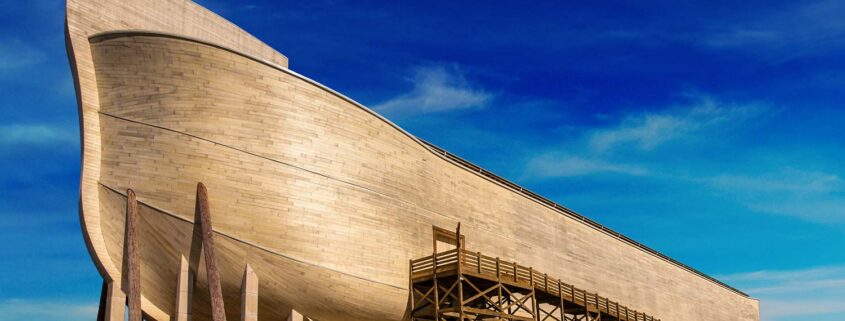God of Salvation
What Is the Good News of Yeshua? (Part 4)
Adam had brought sin into the world, soiling God’s pristine creation. The misstep of the one man caused death to reign for all—the result of disobedience and self-separation from the Creator. Forced to follow through on His covenantal obligation, God enacted His judgment and barred mankind from everlasting life by way of the garden tree. Through his own disobedience, the man was cast away from the presence and provision of God.
As time went on, the descendants of Adam—in their long-separated state—floundered and grew increasingly distant from their Maker. Realizing the full potential of their depravity, they became violent and corrupt, imagining and thinking nothing but evil in their hearts. God saw the abundant wickedness of man—that His most glorious creation had grown into His greatest source of grief. Heart-broken at the degeneracy of His masterpiece, Adonai became “sorry that He had made man” (Gen. 6:5-6, mjlt).
Anguished that the flesh of man had corrupted the earth, God resolved to do the unimaginable… and start over. He determined that He must wipe out all life from the face of the earth—not just the life of men, but of every living thing upon the ground. Though such punishment seems to us to be incomprehensible, the reality is that mankind was already hopelessly lost. Without the swift and severe intervention of the Creator, all men for all time would be doomed to death forever. So with a mixture of staunch judgment and intense regret, Adonai set out to deprive man of his continued existence and “destroy… them with the earth” (Gen. 6:13). The wickedness of man had run its course; all creation stood condemned…
…and yet, the God of Salvation did not leave humanity stranded.
While all of mankind stood apart from God, one man—Noah—“found unmerited favor in the eyes of Adonai” (Gen. 6:8). This “righteous man” had somehow escaped the evil of the world and was “perfect” among his generation (Gen. 6:9), being “seen as righteous” before the face of God (Gen. 7:1). God knew that this was a man who would obey Him and do “all that [He] commanded” (Gen. 7:5). Through Noah, Adonai could redeem His creation; in His grace, God would establish His covenant.
So God declared to righteous Noah that “an end of all flesh [would be] coming” (Gen. 6:13)—that He would soon bring a cataclysmic Flood to destroy the earth. Then God instructed Noah to build for himself a great vessel in which to harbor and ride out the approaching storm. By an enormous ark, Noah would escape the coming judgment and administer the rescue of earth’s creaturely remnant.
Sprawled out over one and a half football fields, encasing two million cubic feet with wood and pitch, the ark carried specimens from every kind of animal of the air and on the ground of the earth. Through the opening on the side of the ark, Noah and his brood entered the narrow doorway to salvation, and when they had fully come in, Adonai closed it behind them (Gen. 7:16). Then “all the fountains of the great deep” broke open, and the deluge of the heavens burst forth (Gen. 7:11). From all directions—from above and beneath—the waters spilled out, seizing and raising up the ark to safety. But as the violent waters covered the mountains, all that drew breath in the grave of the earth died and were wiped away (see Gen. 7:22-23).
Twelve months later, after the ground had become dry, Noah emerged from the ark, built an altar and made sacrifices to God. And God declared in His heart that though “the heart of man is evil from his youth,” never again would He send a flood to destroy His creation (Gen. 8:21). Then God blessed Noah and his sons and told them to “be fruitful and multiply and fill the earth” (Gen. 9:1), and He established His covenant with them.
Though the heart of man is only evil in its imagination, the Good News is that the God of Salvation is still willing to save. Knowing that the flames of violence and sin would keep burning in the flesh of His creation, God still chose to initiate His redemption plan, so that man’s hope for life would not be extinguished forever. By rescuing Noah and establishing His covenant with him, God set a precedent for the way He would now deal with man’s condition. No longer would all mankind be left to its depravity and sin—God would make a Vessel to serve Him and carry forth His salvation.
Did this post bless you?
♥
The God of Judgment judges harshly, but the God of Salvation saves by making a way out. Though He knows how evil we are in our hearts, He is still willing to preserve us and redeem us from eternal destruction. The covenant with Noah closed the door on global watery destruction, yet it did not guarantee man’s eternal safety. Through Noah, mankind received salvation, but how would humanity handle its second chance?
God used a “perfect” and “righteous” child of Adam to begin reconciling His relationship with man. Yet by what righteous one—and through what narrow door, and upon what perfect rescue vessel—may Noah’s descendants be raised up to the unending salvation they do not deserve?

 Ark Encounter
Ark Encounter




Leave a Reply
Want to join the discussion?Feel free to contribute!